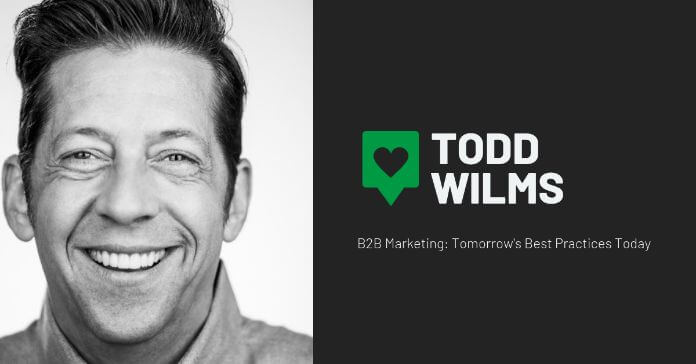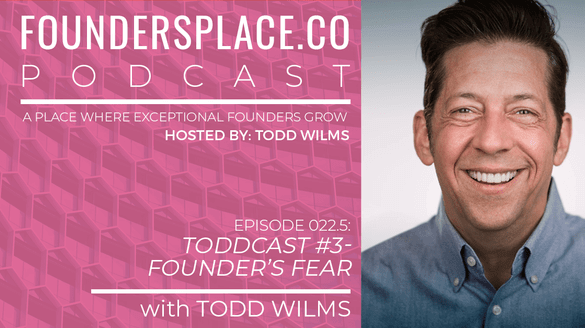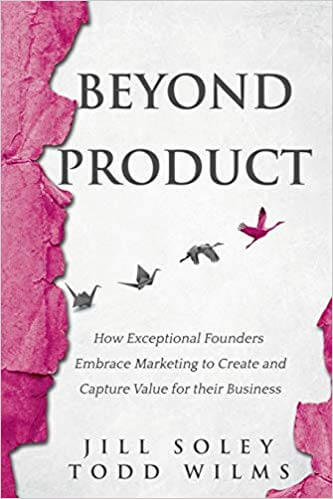In B2B Marketing: Tomorrow’s Best Practices Today, we feature expert interviews about the state of B2B Marketing and what the future holds. In this post, I interview Todd Wilms, Founder of FoundersPlace.co and fractional CMO.
Tell us about yourself?
I’m an author, career marketer, and marketing leader for large enterprise companies, including PeopleSoft, SAP, PayPal, VeriSign and Ebay. I have now started working with founder-led startup companies as I work closer and more intimately with a customer.
I’ve been doing this for a number of years and have worked across a variety of different roles. If I have to label myself, I’m more of a communications and branding person, even though I have discipline in areas of product management, lead gen and performance marketing.
Note: Read a related post from Todd, “Why I launched a project for founders: FoundersPlace.co.”
Tell us about your background in B2B marketing?
I’ve loved the discipline of marketing since I first learned of it in college. Even when I started off becoming a psychology major, I quickly transitioned to marketing and applied the same love that I have for psychology to the discipline of marketing.
That’s understanding why and what makes a person make a decision, what tips them in the direction that they need to go to make that decision, to purchase one thing over another. I love the psychology of it, I love the discipline of it, I love marketing.
As I worked my way up through large scale enterprise companies, your PeopleSoft’s, your PayPal’s, your SAP’s, I found that I was doing less of the actual connecting with customers and over time decided that I wanted to move more closely into direct connection with customers, and therefore started working more directly with startups and founder-led organizations.
You’re host of FoundersPlace.co podcast. How has podcasting informed your marketing?
I have been fortunate enough that my role in the podcast has allowed me to interview over 70 founders, VCs, marketing executives, and those that support the ecosystem of founders and entrepreneurs over the last year.
In the course of having those conversations, I’ve not only gained a new and more grounded appreciation of the life of a startup, but I’ve also changed my impressions and understanding of what it takes to market in those environments, what it takes to market in general, and what it takes to be a founder, and to support a founder or entrepreneur.
Not many people have the opportunity to go in and have these types of interviews, so I consider myself very fortunate that I’ve gotten a master class from these 70 individuals who have been willing to spend their time, effort, and energy with me, to go in and deliver a weekly podcast series, of which I’m fortunate enough to be the host.
Congrats on the new book! What inspired you and Jill Soley to write it?
The book was an interesting labor of love in that we started to see different behaviors in founders, as well as gaps in those founders, when it came to the discipline of marketing.
The thought process follows like this: most founders tend to be product, engineering-driven or finance-driven. Very few founders tend to be from the marketing discipline. Marketing is a bit of a black box for a lot of them.
What we set out to do was help founders, who have a very challenging role, to become better leaders, better entrepreneurs, better business executives, and help their companies thrive and survive by understanding the discipline of marketing.
If you think about it, most leaders don’t have a swim lane. If you’re a CMO, you have a marketing swim lane. If you’re a COO, you have an operations swim lane. But a founder has to swim across all of them and few of them have all the skills necessary to be experts in each of those disciplines, especially as they’re just starting out.
Anything that we can do to help inform, even inspire, educate, and drive them in the right direction would be a bonus for a founder. That was the genesis of the book.
Note: Learn more about the book 👉 “Beyond Product: How Exceptional Founders Embrace Marketing to Create and Capture Value for their Business.”
What’s a best practice that B2B marketers should move on from?
I think the thing that we’ve lost more than anything as we’ve become so focused on the data, on the minutiae, on the microscopic detail, is our connection with the customer. What I hear a lot of is scouring through the data and using the data to drive decisions.
That is absolutely spot on, worthwhile, and I’m not saying that we should move away from data holistically, but in the process of embracing data, what we’ve lost is sitting down and having a direct conversation with customers, and hearing from customers and customer panels, and hearing from customers in the field.
If you’re a large-scale enterprise B2B company and you only have 50 customers, go out and talk to five of them and gain their perspective. If you’re working across a consumer brand and you’ve got tens of thousands of customers, start working on panels and hearing what they have to say across the board so that you have a better, richer understanding.
I can’t tell you the number of opportunities I’ve had to reshape and redirect brands, organizations, even strategies of companies just based on having these detailed conversations with customers and hearing from them directly: why they buy, what they’re overcoming, things that fall through the gaps that the data and analytics don’t necessarily address for the customer behavior.
Tell us a best practice of tomorrow that B2B marketers should be doing today?
Part of this goes back to listening, embracing, and talking to customers. I think the other comes into the idea of content and conversations. We’ve gotten to a place where content is now commoditized.
It’s a thing that is an asset that’s used to draw in customers and used as a lead magnet. That in and of itself is perfectly fine, but I think what we’ve lost is the idea of the conversation.
How do we connect and have conversations with our customers and people in the ecosystem that really matter and really drive the solutions that we’re trying to bring our customers. I think that discipline, that nuance has been lost and I think the customers are worse off for it.
I think founders and leaders are often put adrift because they don’t have these direct conversations with customers, hearing what makes them tick, hearing what works for them, that drive new product and new innovations, and find ways to get our products and services into their hands.
In a former role, you led social strategy at SAP. What was your biggest takeaway there?
The biggest takeaway was that there was and still is a fear of moving things into the digital spectrum. That large, established companies have a DNA associated with them. The larger and older the enterprise, the harder it is to change innate behaviors.
People like fitting into their traditional boxes so even seeing today brands looking to embrace digital marketing and embrace the latest trends and techniques, I find that they struggle and are still five, sometimes ten years behind the curve in trying to embrace the new opportunities that a digital form will provide them.
How will B2B marketing be different in 2022?
We will have a pendulum swing, as we do with most things, where we find something new, we exploit it to the very edges, realize that we’ve gone too far, and come back to a comfortable middle.
For social media marketing, for B2B marketing, for digital marketing, whatever you’d like to call it, I think what we’ll find is we’ll come back to data, and analytics, and performance being important.
But, layered into that, is going to be the human element, the conversation, the connection, the interaction with the customer that has been jettisoned, it’s been forgotten over the last several years.
We’re going to be talking to customers more, listening to customers more, and weaving that in against the data and using both quantitative and qualitative insights and information to make decisions.
I think a lot of brands are starting in that direction and coming back to the fold, so to speak, but I think we’ll see this wholesale over the next couple of years, and certainly within the next three to five years we’ll see this back as the predominant practice for most brands.
Read more interviews
Influencer marketing, chatbots and more with: Neal Schaffer.
The sales funnel, customer journey mapping and more with: Christine Crandell.
Content marketing, removing marketing automation and more with: Joe Pulizzi.



0 Comments on "B2B Marketing Q&A: Todd Wilms on Listening to Customers, the Human Element in Marketing and More"